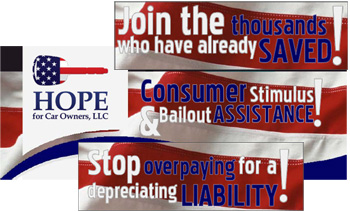The Federal Trade Commission filed charges and requested that a U.S. district court put a stop to the allegedly deceptive tactics of two California-based auto loan modification operations. The FTC asserted that the two separate operations charged hundreds of dollars in up-front fees, based on bogus promises that they could reduce consumers’ monthly car loan payments and help avoid repossession of their vehicles.
Consumers were instructed to pay fees to the companies, and to stop paying their auto lenders. Subsequently, at least one consumer’s car was repossessed, and one set of defendants told other consumers to “hide [their] car[s] to avoid repossession.”

Examples of promotional slogans used on the Hope for Car Owners website.
“Now that the FTC and its partners have stopped hundreds of mortgage loan modification scams, fraud artists are moving to another loan modification scam, preying on consumers who are behind on their auto loan payments and facing repossession,” said David Vladeck, director of the FTC’s Bureau of Consumer Protection. “Despite promising to substantially lower consumers’ monthly payments, these schemes charge hundreds of dollars in up-front fees, leaving financially distressed consumers in worse shape than when they began.”
These are the FTC’s first cases against companies offering auto loan modifications. They come at a time when the volume of auto repossessions remains high. Recognizing that a car is second only to a home as the most expensive purchase many consumers make, the FTC has been highly involved in auto-related consumer issues. The agency recently held a recent series of roundtable workshops to gather information on possible consumer protection issues that may arise during the sale, financing, or lease of motor vehicles.
The FTC charged that Hope for Car Owners, LLC, NAFSO VLM, Inc. and Kore Services LLC (doing business as Auto Debt Consulting), and several individual defendants deceived consumers with false promises, and then did not provide promised refunds when they failed to obtain car loan modifications. The FTC has asked the court to order the defendants to stop the allegedly illegal conduct while the FTC moves forward with the cases.
The FTC alleged that the Hope for Car Owners defendants typically promised to reduce consumers’ monthly auto loan payments by 30 to 50 percent, for fees ranging from $200 to $500. One supposed consumer testimonial represented: “I was 4 months late and on the verge of losing my car to the repo man. Hope 4 Car Owners stepped in and not only stopped the repossession, but they negotiated to reduce my payments from $1200 a month to $548!!”
The FTC alleged that the Auto Debt Consulting defendants typically promised to reduce consumers’ monthly auto loan payments by 25 to 40 percent, for fees ranging from $350 to $799. According to one of the defendants’ websites, “If you have engaged the services of Auto Debt Consulting for negotiating with your lender or bank on your behalf, and if for any reason you are dissatisfied with our services or we are unsuccessful in the negotiation process we will provide a 100 percent money back guarantee.”
The complaints are part of the FTC’s ongoing effort to protect consumers in financial distress. They allege that both operations’ deceptive business practices violated the FTC Act.
According to the FTC’s complaints, both groups of defendants marketed their services on company websites, with statements like: “Join the thousands who have already SAVED! (Hope for Car Owners) and “Lower your monthly vehicle payments by as much as 40% regardless of your credit score!” (Auto Debt Consulting).
The FTC alleged that the defendants provided toll-free numbers for consumers to call so that telemarketers could sign them up. Many consumers were told to stop making payments on their auto loans, which increased the risk that their vehicles would be repossessed. But the FTC asserts that once the up-front fees were collected, neither operation did anything to obtain the promised loan modifications, consumers who tried to get refunds were denied, and one consumer’s vehicle was repossessed by the finance company.
Hope for Car Owners allegedly took $400 from one consumer and told her not to make any more payments on her vehicle. The consumer did not send her next payment to her auto lender, and the lender soon informed her that her vehicle was going to be repossessed.
The FTC has a new publication for consumers who are looking for help managing their auto loans. For more information, see: Ads for Auto Loan Modifications: You May Be Able to Drive a Better Deal with Your Lender.
The Commission vote authorizing the staff to file the Hope for Car Owners complaint was 4-0. The FTC filed the complaint and request for preliminary relief against the Hope for Car Owners defendants in the U.S. District Court for the Eastern District of California. The complaint also names as a defendant Patrick Freeman.
The Commission vote authorizing the staff to file the Auto Debt Consulting complaint was also
4-0. The FTC filed the complaint and request for preliminary relief against the Auto Debt Consulting defendants in the U.S. District Court for the Eastern District of California. The complaint also names as defendants Michael Kamfiroozie and Naythem J. Nafso.
The FTC would like to thank the Better Business Bureau Serving Northeast California for its help in these cases.
NOTE: The Commission files a complaint when it has “reason to believe” that the law has been or is being violated and it appears to the Commission that a proceeding is in the public interest. The complaints are not findings or rulings that the defendants have actually violated the law.
The Federal Trade Commission works for consumers to prevent fraudulent, deceptive, and unfair business practices and to provide information to help spot, stop, and avoid them. To file a complaint in English or Spanish, visit the FTC’s online Complaint Assistant or call 1-877-FTC-HELP (1-877-382-4357). The FTC enters complaints into Consumer Sentinel, a secure, online database available to more than 2,000 civil and criminal law enforcement agencies in the U.S. and abroad. The FTC’s website provides free information on a variety of consumer topics. Like the FTC on Facebook and follow us on Twitter.
- STAFF CONTACT:
- Malini Mithal
Division of Financial Practices
202-326-2972
FTC File Nos. 1223021 (Hope for Car Owners), 1223019 (Auto Debt Consulting) Auto Loan Mods NR

